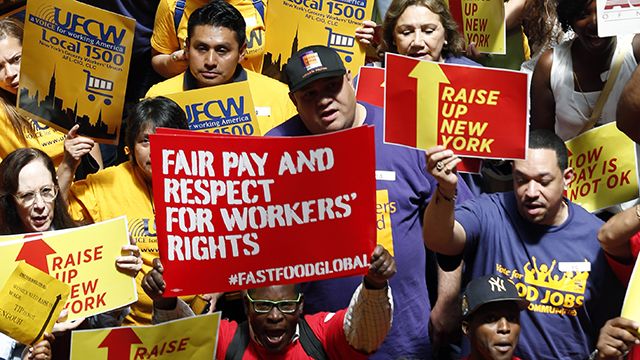This post originally appeared at CommonDreams.

We don’t think enough about the economic functions of social welfare policy, or about the relationship between the safety net and labor markets, and this hinders our ability to make sense of why some people fight so hard against programs that aid poor and low-income people: We mistake them for anti-welfare ideologues, and dismiss them as cruel or ignorant, but there’s an economic logic to their activism, one that’s revealed if we look at the relationship between welfare and work from both the employee’s and the employer’s perspective. Let me explain.
Imagine that we have two workers, worker K and worker O, each with two young children.
Worker K is laid off when the company “downsizes.” K is nervous, but has some savings, is eligible for Unemployment Insurance benefits, Medicaid, food stamps (SNAP) and TANF, has access to free local day care and lives in a Section 8 apartment, with their monthly rent tied to their income.
While K is not living as well as when working, if K were eligible for all of these programs, which would be highly unusual, K will be able to get by. K can pay the rent and buy food and remain insured and with some belt-tightening, will be okay for a while.
Worker O, by contrast, is fired, even though O didn’t do anything wrong. O is therefore ineligible for UI. O has no savings, cannot afford insurance, even with a subsidy through the Affordable Care Act, is not eligible for Medicaid or food stamps or TANF, has no reliable, affordable day care and has no access to a housing subsidy. As a result, O is in trouble, and is desperate and perched on the edge of homelessness.
Now, let’s turn our attention to an employer with a job to fill, Z. This job is terrible. It’s minimum wage, has no health benefits, no paid days off or vacation time, has irregular hours — some weeks you’ll need to work days, some weeks nights (and you won’t know in advance so you can plan), and you’ll get 20 or maybe 30 hours each week, if you’re lucky. There’s no opportunity for upward mobility, it’s a two-hour drive each way, with no reliable public transportation to get you there and the working conditions are unsafe — there have been lots of injuries there. As I said, it’s a terrible job.
Employer Z offers unemployed worker K the job. What’s K’s answer? It’s no, of course. Maybe even hell no. Does K say no because K is lazy? No. K says no because this is not a job that will help K raise a family and move up the ladder, and taking it would mean being unable to look for something better, among other things. It is rational under these circumstances, smart even, to turn down this job. If you can. And K can.
Now, Z offers O the job. What does O say? O says yes. Maybe even yes please. Why? Because O does not have any choice. O is desperate. O is in no position to bargain, or to wait for something better.
It may be even worse than this, because there might be a worker called V who is even more desperate than O. So, V says: “I know you can’t legally pay me less than minimum wage, but if you hire me instead of O, I’ll come in early and work for an hour before punching in, and then after I punch out at night I’ll stay for an extra hour then too.” When workers are desperate, they bid down their own wages.
If you are a worker, would you rather live in a country where most people were in K’s situation, or in O’s? K’s, of course, right? Because in that world, with very generous social welfare benefits, you would have some security, and some bargaining power.
If you are employer Z, would you prefer to live in a country where most people were in K’s situation, or in O’s? O’s of course, right? Because in that world, with very limited social welfare benefits, workers would have no choice but to accept whatever job you offered under whatever conditions; in a world with very generous social welfare programs, by contrast, everyone would have the ability to decline work, and if you want to hire someone, the burden would be on you, the employer, to make the job more attractive — you might have to offer higher wages, paid vacation or sick days, a regular schedule, health insurance and opportunities for promotion. Many of those would mean lower profits.
This is why business and their elected allies fight efforts to expand food stamps or unemployment insurance or TANF. A desperate worker is a cheap and compliant worker.
So the next time someone is fighting against a proposal to increase the assistance available to poor and low-income people, take their objection seriously and ask, simply, who benefits?


